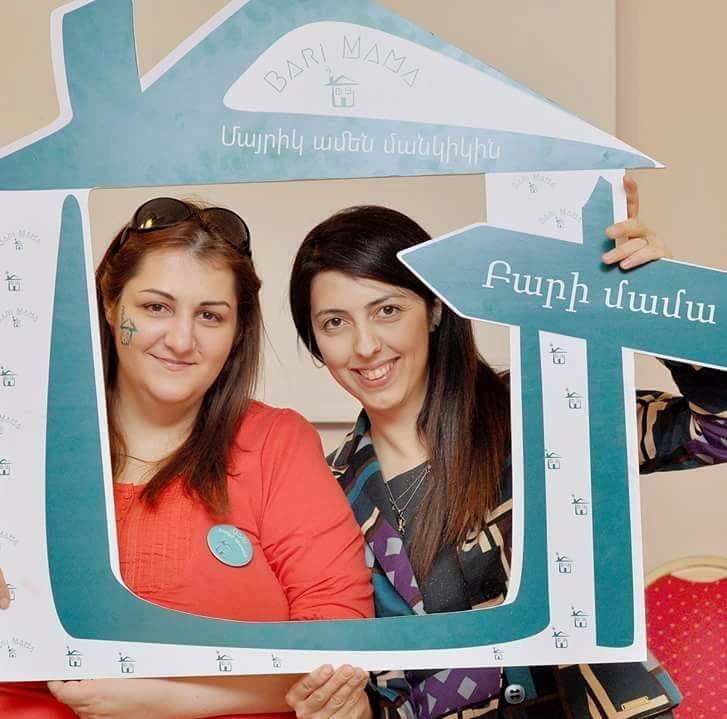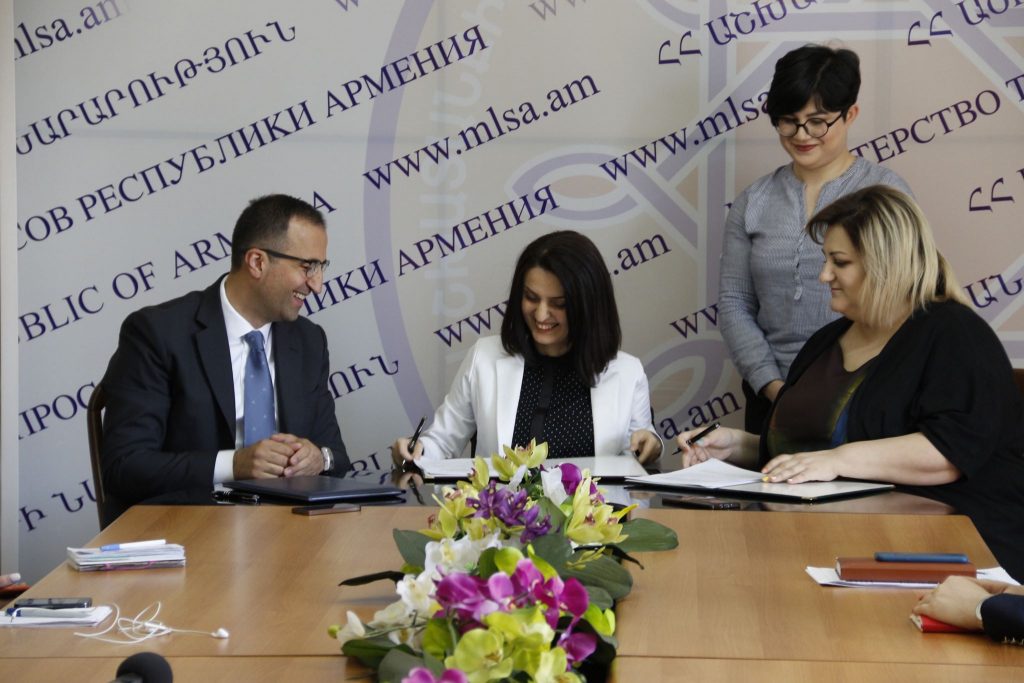‘Not the child we dreamed of’ – how Armenia is preventing the abandonment of disabled children
Why do parents give up their children born with disabilities to begin with? And when they don’t, who helps them when they agree to raise them?
Armenia’s National Assembly introduced an amendment to the Criminal Code in June 2020, according to which persuading a parent to abandon their children will now be considered a criminal offense.
The move targets doctors or other individuals who push parents into giving their children to orphanages if they are born with disabilities.
- Work for people with disabilities – photo report from a cafe in Armenia
- Born by another woman – surrogate motherhood in Armenia
Letters that go unanswered
“I am Ani (name changed), I am 17 years old. I am the second child. Before me they had a daughter with a cleft palate and a cleft lip. At the hospital, my parents were told that the child would not survive. Friends and family advised them to give her up.
“I don’t know what happened to my parents then, but they left the baby in the hospital. For many years they were convinced that the daughter died shortly after birth. Six years later, they received a call from the orphanage. It turned out that the girl is alive, they are going to adopt her. But for this it is necessary that the mother and father give up parental rights.
“In the orphanage, father was persuaded to abandon the girl, they said that foreigners who want to adopt her can organise an operation and ensure her a healthy life, and in Armenia she will be mocked.
“Several years ago, my father died of a stroke without ever forgiving himself.
“It’s just me and my mother now. She has cancer. I just want to find my sister to ease the suffering of my mother. I want her to know that my sister and I will not be alone in this world. Help me find my sister, help my dying mother learn about her daughter’s fate.”
Hundreds of similar letters to various authorities remain unanswered. Most wanted children already have new families, new names, surnames a new life. Information about them is not subject to disclosure by law. And families, whose destinies were crippled by the advice of relatives and friends, are now deprived of the chance to unite, or these chances are negligible.
Why people abandon children
In Armenia, children are abandoned mainly for two reasons: if the child is unwell or if the family is very poor. If the case rests on social problems, then parents usually send the child to an orphanage, but do not give them up. They visit, keep in touch. If a child has health problems or disability, as a rule, parents give them up immediately – in the very first days after birth.
There are five state orphanages in Armenia, two of them are intended for children with disabilities. In total, there are approximately 600 children in five orphanages, 70% of them have health problems or disabilities.
According to the Manuk information system for registering children in difficult situations, in 2015, parents abandoned 66 newborns with health problems, in 2016 – from 50, in 2017 – from 49, in 2018 – 33, and in 2019 – 34. In 2020, there has been just one such case.
According to the same information system, children with health problems or disabilities are almost never adopted in Armenia.
When women act instead of the state
In 2014, Armenia was shocked by the story of a baby who was born without two arms and one leg. The media reported that the child was abandoned, he was left without parents, clothes and food.

Marine Adulyan remembers the reportage, which showed this crying child. The next day, she hurried to his hospital. It was this story that united and rallied a group of women volunteers who later created the Bari Mama (Kind Mom) charitable organization.
“The kid was already in the orphanage, we were going to celebrate his birthday – he turned one year old when I received an anonymous message with the phone number of his parents. And she called right away. It turned out that the family was in a serious psychological state, on the verge of divorce. The mother had been told the baby was dead. She realized that he was alive when she saw the poster of our organization with a photo of the baby.
Long-term work with the parents began. It is always a difficult process. But a year later, the baby returned to his family,” says Marine Adulian, chairman of the Bari Mama charity.
This child became the first of those 150 who managed to avoid the fate of growing up in an orphanage.
In the first year of work, Bari Mama simply went to orphanages and hospitals, found abandoned children, tried to provide them with everything they needed and explain to their parents that the kids need them most of all.
“To abandon a child is a difficult decision. It is important that parents, faced with problems, do not feel alone, not be afraid of difficulties. The environment and their relatives should take care of them. When in fact, everything happens the other way around.
“Especially in medical institutions, parents are persuaded to leave the child, to start a new life. ‘He will never recover,’ ‘You are young, give birth again,’ ‘It is a vegetable, not a child.’ Parents of children with health problems hear such parting words. But the hell doesn’t end with abandoning a child. Parents remain stressed for a long time, suffer from insomnia and nightmares, many families simply break up after that,” says Marina.
Now Bari Mama is acting more confidently, as state structures have begun to promote and support such organizations. Two years ago the “Bari tnak” (good house) program was launched, which provides shelter for parents who are faced with a choice – family or child, and have chosen the baby.
“In our shelter, parents can live with a child for 6-12 months, however, fortunately, almost no one stays with us for six months. When the family understands that the mother is not going to give up the child, and also thanks to our consistent work, they finally accept the baby,” says Marine.
Soon, the home will also accept individuals who have to leave orphanages upon turning 18, and they will be helped in training for a profession and finding a job in order to be able to live independently.
Easier to prevent the problem in the first place
Since April 2019, within the framework of a memorandum signed between the Ministry of Labor and Social Affairs, the Ministry of Health and the Bari Mama organization, work has begun on another programme, the goal of which is to prevent children with disabilities from ending up in orphanages in the first place. The UN Children’s Fund also contributes to the programme. Project participants have already ensured that 28 babies remain in families.

In 2020, the Ministry of Labor commissioned a similar program to four civil society organizations. But the goal of this project is not only to prevent the admission of children with disabilities to state institutions, but also the return of children from orphanages to their families.
Under this program, 565 families were provided with food rations, hygiene items, clothing, footwear, school supplies, and communal expenses were partially reimbursed.
Minister of Labor and Social Affairs Zaruhi Batoyan is sure that it is easier to prevent a child from entering an orphanage than to return them to the family later:
“A child should live in a family, and the state should help a family in a difficult situation. Health problems or disabilities should not be the reason for abandoning a child in Armenia, where the role of the family is initially large and where social ties are maintained. Working with families can give serious results. People should feel the support of the state – in the form of accessibility of services, creation of opportunities”.
Batoyan says in the fight for these children, the amendment to the Criminal Code criminalizing inducement or coercion to abandon parental rights has been incredibly important.
The law provides for more severe punishment if it is violated by a health worker, as well as in the case of the use of force or threats.
“These are just the first steps of our large program, which begins in the maternity hospital and includes the issue of parental employment, provision of temporary housing, and the support of a psychologist. As a result, the number of waivers of parental rights in the first year of a child’s life has already decreased in comparison with previous years. In 2020, there was only one child abandonment due to the state of his health. But in the country of my dreams, this number is zero,” the minister says.


















